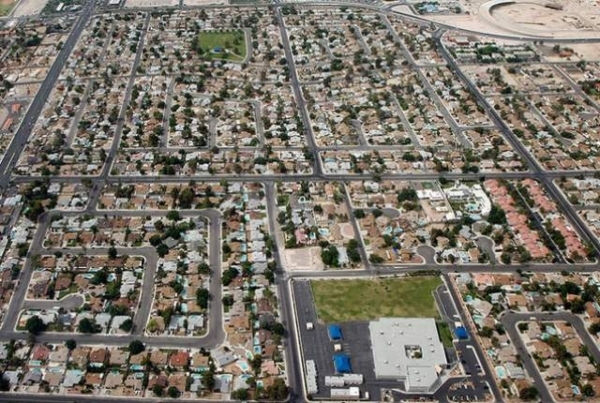Real estate agents, HOAs battle over liens
It's a Nevada Supreme Court decision that didn't resolve much.
The court's September ruling in SFR Investments Pool 1 LLC v. U.S. Bank gave homeowner associations the right to wipe out entire mortgages through foreclosures for late dues. But it also launched a legislative effort to reverse the right to what's called a super-priority lien.
Today, the battle continues between real estate agents, who say the rules put banks on the brink of a local lending boycott, and HOAs, who say the system is finally working the way it should.
Both sides have taken to courts and to Carson City to make the case for additional change. The results could have long-term implications for Southern Nevada's housing market.
One thing the legal challenges and legislative changes have yet to accomplish is to seal the bitter division between the two sides.
Question of fairness
It's "rank unfairness" to let an HOA with a claim of $3,000 or $4,000 in late dues and fees foreclose on a lender and wipe out a $300,000 first mortgage, said Keith Lynam, president of the Greater Las Vegas Association of Realtors.
Allowing super priority also undermines the local real estate market.
"Lenders have made it clear that extinguishment of noteholders needs to be addressed. If it's not, it will be addressed for us," Lynam said. "They have made it clear they will not lend here."
Association managers counter that the real unfairness happens when banks let delinquent homes languish, HOA dues unpaid.
The Supreme Court's decision helped patch that problem, said Norman Rosensteel, vice president of the Nevada chapter of the Community Associations Institute and president of ATC Collections Group.
The ruling "made a lot of banks step up and pay assessments," he said.
Without the fear of seeing their note nixed, nothing forced banks to pay up, Rosensteel added. Sometimes they would delay paying for years, because pulling the plug on a delinquent loan and selling a foreclosed home would put bad numbers on the books and force a sale in a down market.
"A lot of associations had to decide what bills they could pay and what services they had to cut back on," Rosensteel said. "Typically, they cut back on security companies and patrol services. Some tried to cut back on landscape maintenance. Many associations stopped making monthly transfers to fund their reserves."
Most association board members have no interest in the hassles of buying or renting out a delinquent unit, so in most cases HOAs simply quitclaimed the foreclosed home back to the homeowner for the amount owed, Rosensteel said.
The problem was, the amount owed wasn't simply past-due assessments. Homeowners, including banks, had to shell out thousands more in collection fees. So what associations really did was make a fortune on administrative charges, sometimes through companies their management firms owned, Lynam said.
"It's created tremendous revenue for HOA managers and their collections companies. It's a system rife with abuses," he said.
Still, the biggest potential fallout a lending embargo — isn't borne out by the numbers.
Statistics from real estate research firm RealtyTrac show that lenders originated 15,435 local mortgages in the first quarter of this year. That was down 5 percent from last year's third quarter, when the Supreme Court issued its decision. But originations fell even more nationwide, dropping 10.6 percent in the same period, to 1.6 million.
RealtyTrac Vice President Daren Blomquist tied the declines to an uptick in mortgage rates in late 2014.
Year over year, originations in Las Vegas were up significantly, jumping 14 percent from 13,568 in the first quarter of 2014, as interest rates dipped in early 2015 and new federal rules made mortgage insurance and down payments more affordable.
"At least in practice, lenders are not pulling back," Blomquist said.
A state law scheduled to take effect Oct. 1 could keep it that way, at least in the near term.
Tougher notification laws
Senate Bill 306 will "add a lot of protections and clarifications" to super-priority laws, Rosensteel said.
For starters, it will toughen notification laws. Banks today have to record a request for notice of an HOA sale. After October, they'll automatically be notified.
Banks will have to do their part, too: HOAs have trouble finding details on who should get notices, and where. Starting Oct. 1, lenders will have to provide the state Financial Institutions Division with the name and address of a contact in case of HOA default. Contact information will appear on the division's website.
There's also a redemption period that lets lenders reclaim a property within 60 days of an HOA foreclosure sale.
All of those regulations should mean fewer HOA foreclosures.
"It cleaned up the process and went a long ways toward helping," Lynam said.
There's just one problem, he said: The law will still allow HOAs to extinguish first deeds of trust, continuing uncertainty for lenders.
So sales agents and lenders are eyeing other lawsuits and future legislative sessions for more fixes.
Lien laws seen changing
Several cases involving super priority are working their way through federal courts, so lien laws will keep changing, said Zach Ball, a local real estate attorney and managing partner of the Ball Law Group.
But the Nevada Supreme Court's ruling "solidified" much of the state's law, he said.
"The majority of arguments being pushed forward at this point are minor. The laws might change in limited cases, but I think overall, the Supreme Court's decision will stand that super priority wipes out the holder of the first deed of trust."
That's why real estate agents and banks are looking forward to the state's 2017 legislative session.
Lynam all but guaranteed the law will change then. A bill to end super priority passed the Assembly in the spring, but it missed the deadline to shift to the Senate by less than an hour.
"I'm very confident we have the votes," Lynam said.
But with two years until the next session, Lynam said he can only hope that super-priority liens won't hurt the market anymore.
"Let's hope there are so few of these that it doesn't become an issue and the feds don't pull their lending out."
That's not likely, Blomquist said.
The 15,435 local mortgages that lenders issued in the first quarter had a volume of more than $3.6 billion.
"It depends on the level of risk, but that's a lot of money on the table for lenders to walk away from," he said. "It would have to be a very serious threat for them to do that. And there are tools for them to mitigate that risk by monitoring HOA foreclosure notices."
Ball agreed that the borrowing outlook should stay relatively healthy.
"You hear the battle cry that banks aren't going to lend, yet the banking community goes forward with making loans in the state. Fees may go up, and interest rates may increase, but to stop lending in a major metro area like Las Vegas would seem like a real loss of business."
Contact Jennifer Robison at jrobison@reviewjournal.com. Follow @J_Robison1 on Twitter.


















